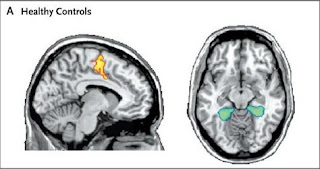 In the early 2000’s, the Terry Schiavo case took the media by storm and pushed into the spotlight a number of ethical questions regarding patients in persistent vegetative state (awake but not aware). Evidently, none of this would have happened if we could just have asked her whether she wanted to continue living or not. A simple yes or no question. Could this be achieved? Can patients in a vegetative state communicate purposefully? A new study suggests they can.
In the early 2000’s, the Terry Schiavo case took the media by storm and pushed into the spotlight a number of ethical questions regarding patients in persistent vegetative state (awake but not aware). Evidently, none of this would have happened if we could just have asked her whether she wanted to continue living or not. A simple yes or no question. Could this be achieved? Can patients in a vegetative state communicate purposefully? A new study suggests they can.The researchers looked at brain signals from 16 healthy patients and 54 patients with severe brain injuries who were in a vegetative state. The technique they used is called fMRI (for functional magnetic resonance imaging), a scan similar to one you would get for a joint injury, but instead of taking static images, fMRI measures blood flow in your brain. Presumably, if part of your brain is activated, there will be an increase in the blood flow in this area, and this will area will light up on the brain image.
The first experiment was done only with the healthy controls to establish that different cognitive tasks lead to the activation of different parts of your brain. While immobilized in the fMRI machine, the subjects were asked to imagine playing tennis. They then asked the healthy subjects to imagine walking through a familiar house. As expected, the brain scan images showed that each task activated a different brain region.
Armed with this control data, the researchers moved on to the patients in vegetative state. They asked each of the 54 patients to think about playing tennis and to think about navigating through a familiar house, and looked at the resulting brain signals. Of the 54, they found a grand total of five patients whose brain signals matched that of the healthy controls during a given task. This result suggests that some patients in a vegetative state can willfully influence their brain activity.
While this is an interesting finding in itself, there’s more. The researchers then took one of the five patients who showed the correct brain activity, and asked him yes or no questions. The patient was instructed to think about tennis when he wanted to answer yes, and think about the house when he wanted to say no. Out of the six yes or no questions he was asked (such as “Is your father’s name Alexander?”), he correctly answered five. Success!
The researchers and the media were quick to take these findings to the next level: with this new technique, we can now have brain damaged patients express their feelings! We can increase their quality of life! We can ask them important ethical questions! Well, hold on. While I do agree that this is a very interesting study, and that it will no doubt give a lot of hope to the families of patients in vegetative state, one has to be very careful with interpretation. First, let’s run the numbers: out of 54 patients, only five responded to the tasks. Out of those five, only one was tested. Out of the six questions asked, five were answered. While this represents a great achievement, we are very far from being able to extrapolate the potential of this technique. Second, the fMRI technique is expensive, imperfect, and very difficult to interpret. Third, certain words could possibly cue brain activity that may or may not be willful. I would like to see the researchers do an experiment where they just say the word “tennis” or “house” to healthy volunteers without asking them to imagine anything and see what kind of brain activity results. Finally, the fact that a patient has the cognitive ability to picture playing tennis does not mean he or she has the cognitive ability to make important, ethical decisions. So before we get all excited, I think we should keep things in perspective. But one thing is for sure: in this age of medical technology, we can set the Ouija board aside.
Reference: Willful modulation of brain activity in disorders of consciousness. (2010) Monti MM, Vanhaudenhuyse A, Coleman MR, Boly M, Pickard JD, Tshibanda L, Owen AM, Laureys S. New Engl J Med Feb. 3 [Epub ahead of print].




2 Responses to “Do you want to live? Yes or no?”
Ethical assessments in such cases seem rather complicated. I am not even sure that any healthy brain activity could be willful, implying that there is some sort of entity in there using the brain.
Communicating with Terry doesn’t prove the existence of a “vegetative homunculus” trapped inside an unresponsive brain.
Hi Doru, thanks for your comment!
You make a good point about the difficulty of defining "willful" brain activity. Correct interpretation of these brain signals is definitely a challenge...
Post a Comment